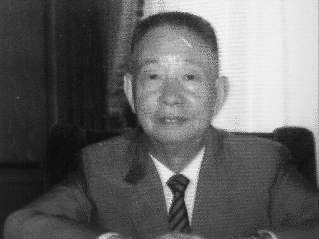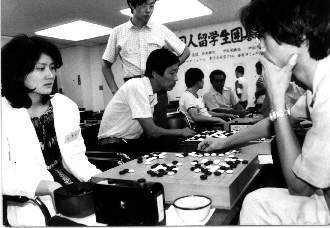

|
His foundation in Taiwan, The Ing Chang-ki Goe Educational Foundation, offered US$1,400,000 to the programmer of the first computer program that can beat a selected twelve-year-old GO player.
The reason that Ing Chang Ki will not be universally well remembered is that, like God, he wanted to re-create the game in his own image. He invented his own rules for the game of go. His rules were just a minor variation on the established rules, but they were still his rules. He had his own sets and boards designed and made and his own way of counting points. If you wanted to get part of the million dollars he was giving every year, you had to play his way. Finally, in the unkindest cut of all, he insisted on giving the game his own name. Instead of calling it GO, he called it GOE.

|
In spite of this, Ing Chang Ki did a lot of good for the game of go. One thing I especially appreciated about him was that he alone allowed a Chinese girl to compete in his version of the World Championship of Go. Rui Nai Wei is the Judit Polgar of go. She is without doubt not only the strongest woman go player in the world, but she can, on any given day, defeat the best male players in the world. Rui Nai Wei might even be the strongest go player in the world, but we will never know, because she is banned, boycotted, blacklisted and not allowed to play.
Except that Ing Chang Ki let her play.
Ing Chang Ki paid a heavy price for this. Because of this, the Mainland Chinese refused to send players to competitions sponsored by Ing Chang Ki. The Chinese knew that Rui Nai Wei had defeated their own champion, Nei Wei Ping. The Chinese were afraid to face her in a serious match, and so they did not come, thereby depriving the World Goe Championship organized by Ing Chang Ki of its legitimacy.
Rui Nai Wei played and defeated several of the top players in the world, but finally she lost to Otake Hideous in the semi-final round of the Ing Chang Ki World Goe Championship. She has not been allowed to compete since.
One rumor is that the reason that the Mainland Chinese refuse to play against Rui Nei Wai whereas they play against Li Li What's-Her-Name, the fabulously beautiful wife of Michael Redmond, and against all of the other runaway Chinese girls is that (1) unlike the others, Rui Nai Wei is a very serious threat and (2) Rui Nai Wei accepted a lot of money to pose nude for a Chinese playboy magazine.
Ing Chang Ki helped out Ishi Press during a period of great financial difficulty, although perhaps he could have done more. For a period of more than one year, Go World magazine could not be published because of a lack of money. This hiatus ended and Go World resumed publication when Ing Chang Ki offered to contribute $9,000 for each issue of Go World that came out.
By the way, the reason that Go World started publishing articles about the game of goe just about the time that the $9,000 per issue started rolling in was not because we had been bribed by Ing Chang Ki to use that name. Rather, this was due to a variation of the WAZZU virus which had gotten into our word processing program which changed the word go to goe. Unfortunately, this problem was not discovered and solved until after the magazine went out. At least the magazine was still named GO WORLD and not GOE WORLD.
Unfortunately, and certainly due to no fault of Ing Chang Ki, this $9,000 per issue greatly contributed to the demise of Ishi Press as the world's leading publisher of books pertaining to the game of go (and also led to me becoming its president after it became virtually defunct). The reason for this is that James W. Connelley of Ishi Press International in San Jose, California decided that he wanted to get that $9,000 per issue himself. Since Connelley had no capability of putting out a go publication himself, he offered to print our magazine in California, which he said he could get done more cheaply than in Japan. So, in mid-1994, we sent him the camera ready copy of GO WORLD 71, with the understanding that it would be printed promptly. Months passed and the magazine was not sent to the printer. It turned out that Connelley was waiting to receive the $9,000 from Ing Chang Ki, to which he felt that he was now entitled.
Later, an extremely dirty, nasty guy named Hartland Snyder, who had the audacity to show his ugly face at the American Go Congress a few weeks ago, got involved. Hartland Snyder is a known con artist and swindler who has a myriad of court judgments, both civil and criminal, against him for fraud, domestic violence and other offenses, but whose father was a close friend of the famous physicist, Robert Oppenheimer, which enables him to move in intellectual circles. Hartland Snyder decided that he too wanted to get that $9,000. He started calling himself the "Acting President" of Ishi Press, a purely fabricated title, and wrote a letter to Ing Chang Ki telling him not to send the $9,000 to us but rather to send it to Hartland Snyder and he would put out an issue of Go World magazine. Hartland Snyder, who knows nothing about the game of go, even contacted several prominent go players asking them to write articles for this magazine.
As a result, Ing Chang Ki decided to stop sending the $9,000 to anybody. Neither James W. Connelley nor Hartland Snyder ever published an issue of Go World. Because of the loss of the $9,000 per issue plus the fact that there were now several groups all claiming to be the real Ishi Press, we were forced to stop all publication, not only of Go World but also of all go books. An entirely different organization called Kiseido took over the publication of Go World. A new issue of Go World just went out a few hours ago.
Again, this was by no means any fault of Ing Chang Ki, who was merely trying to help. Ing Chang Ki also gave money to the American Go Association and numerous other groups.
I met Ing Chang Ki only one time, which was in January, 1985. At that time, my dear friend, Manfred Wimmer, the former European Go Champion, had been deported from Japan due to a series of unfortunate misunderstandings involving Japanese girls. Ing Chang Ki had given Wimmer temporary refuge and a place to stay in Taiwan.
I was working on a computer program to play go. I had already written programs to play chess and Japanese chess ("Shogi"). My shogi program had been featured in an article in a Japanese computer magazine. I later competed in the 1986 World Computer Chess Championship with my chess playing program.
When I came to Taiwan, I wanted to bring about the establishment of tournaments for computer go and computer Chinese chess. I went to the offices of Ing Chang Ki and met Wimmer, who was playing go with the personal assistant to Ing Chang Ki (whose name I forget at the moment. Somebody please supply it. He is a 7-dan player). I told them what I wanted to do. After some discussion about this, I was shown into the inner sanctum (and it really was an inner sanctum) where I had a private personal meeting with Ing Chang Ki with nobody else present.
I started talking about Chinese chess. (Good idea, Sam!) Ing Chang Ki asked me if I knew about goe. I told him that I was not really a strong player but I was writing a program to play go and, in order to encourage others to do this, I wanted to establish a world computer go championship.
Ing Chang Ki brought up two different subjects. One was: He said that the komi (the handicap the player with the first move in go must give) was too small. It was either 4 1/2 stones or 5 1/2 stones. However, his statistical analysis showed that at this komi the player of the first move still wins the vast majority of the games between equal opponents, so he wanted a higher komi.
Secondly, he felt that there should be a world rating system for go. He knew I was familiar with the chess rating systems and he wanted to learn about them. I told him that I was an expert on both the USCF rating system and the FIDE Elo rating system (as I was at that time). I offered to develop and establish a world go rating system for him.
Ing Chang Ki gave me as a present a new type of go set which, he told me, had just come out. He told me that he had just received a shipment from the manufacturer and, by giving me this set, I had become the very first person to receive one.
I took it to America with me. This later became known as the "Ing Chang Ki Go Set". It involved a box with an exact count on the number of stones which is turned upside down to count the score. (However, according to others, this was merely a variation on similar sets he had previously produced.)
Ing Chang Ki never responded to my offer to establish a world rating system for go (which I still believe is a good idea) but I have been told that it was because of my meeting with him that he did establish a world computer goe championship shortly thereafter.
That is really all I know about Ing Chang Ki. I am aware that many people did not like him. Nevertheless, he was an important person who deserves to be well remembered. If anybody can tell me anything more about his life, please do so.
Sam Sloan
Here are links: